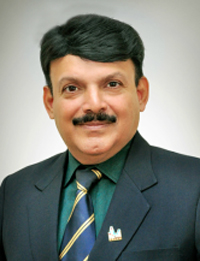This is an age where imbecile politicians, especially in Kerala and Tamilnadu, castigate Hinduism or Sanatana Dharma, vituperatively. Either they are plain ignorant, or pretend to be misinformed, while spewing verbal diarrohea on Hinduism and its traditions. Hinduism is trapped in a syndrome, described by Chinese philosopher Lao Tzu as – “Those who speak do not know and those who know do not speak”. But, when we read about the illustrious list of scientists, philosophers and politicians from other countries who were enamoured of Hindu philosophy and practices, it makes us feel proud of the countless Rishis and Rishikas, who contributed to the enrichment, development and codification of Hindu philosophical systems.
While there has been a steady procession of Western scientists and philosophers, admirers of Hinduism from the Middle East are unheard of. An enigmatic personality of contemporary times, who grew up to be the tribal chief, was also the head of a well-armed militia, a millionaire businessman, simultaneously a vegetarian, and a mystic socialist, a central political figure in Lebanese politics, who shuttled between the public, political life of modern Beirut and the 300-year-old family castle in the mountains 50 miles away, where he ruled the mystery-shrouded Druze sect. He was a multimillionaire landlord with some of Lebanon’s largest land holdings, was a warlord, but deeply inspired by Mahatma Gandhi, a keen student of Hindu and Buddhist beliefs, despite being a Druze. He is Kamal Jumblatt.
Kamal Jumblatt was born in Mukhtarah, Lebanon, in 1917. He was the only son of Fuad and Nazirah Jumblatt. His ancestors were the Kurdish Janbuladhs who converted to the Druze faith and were in control of an expansive feudal entity in northern Syria. In the 17th century they established themselves among their Druze Tanukh and Manid kin in south-eastern Lebanon, by which time their surname had evolved into Jounblatt (written Jumblatt).
The Druze, who number about 200,000 are a seemingly anachronistic sect that is an outgrowth of Islam and had its own origin in Cairo in 1071. It is a secretive society and is known for its cohesion and loyalty. A key practice of the Druze religion is dissimulation: Druze are permitted and encouraged to profess publicly the policies of the society in which they find themselves. This outward flexibility and inner secrecy account for the tiny, distinctive sect’s survival through 1,000 years in turbulent Lebanon.
The Progressive Socialist Party that Jumblatt founded shortly after World War II professed a blend of nationalist and anti-Western themes and pursued a moderate socialist program. Jumblatt was in and out of the Cabinet, serving as minister of education, of public works and, twice, of interior. His socialists and Lebanon’s Moslem leftists formed a convenient common front with the Palestinians against the Christian entrenched control of Lebanon, despite a population shift that had given Moslems a majority. When other Moslem leaders, showed a willingness to end the war, Jumblatt – poet, mystic and Lenin Peace Prize winner – pressed on, hoping to wrench major concessions from the Christians. Only when Syria sent its forces to help the Lebanese right wing did Jumblatt give in. Then, the unlikely warlord , whose suit was always rumpled and tie askew, who slumped as he walked and spoke in a weak, croaky voice, went back to his yoga, his poetry and his philosophy. The French author, Remon Bernard, considered him “A school of pure high wisdom.”
The Jumblatt family were known for their faithfulness, courage, and piety. Kamal Jumblatt’s father, Fouad, was assassinated on August 6, 1921 when Kamal had not turned even four years old. His mother, Nazira Jumblatt, adopted the leadership after her husband’s death. Kamal Jumblatt after finishing his secondary school in 1937, joined the Sorbonne University in France in 1939, where he graduated with two degrees; one in psychology and one in sociology. Then that same year, and because of World War II, Jumblatt returned to Beirut to study law at the Jesuit University. But, Jumblatt’s interest was in meditation and reflection. He never showed interest in politics until his mother insisted that he be prepared for that career. She succeeded in convincing him to become a politician. In September 1943, Jumblatt was elected a member in the Lebanese Parliament. His clout in presidential elections earned him the label “king-maker.” As a Druze, Jumblatt could not hold any of the country’s three top offices, as the system in vogue was that the president must be a Maronite Christian, the prime minister a Sunni Muslim and the speaker of the parliament a Shiite, but Jumblatt made and broke national leaders, sometimes making and breaking the very same man, when his mood or the situation changed. Jumblatt championed the Palestine cause for a national homeland and went into open alliance with the Palestine Liberation Organization (PLO).
To provoke Jumblatt to fight politically, in May 1976, his sister, Linda, was assassinated. However, Jumblatt, had by then become profoundly interested in Hindu philosophy. When presented with the names of the assassins, he refused to look at them saying, “What’s the use of these when I don’t believe in revenge?”

Kamal Jumblatt was a unique person, was a scholar in philosophy, ethics, sociology, economics, and deeply religious. The mystery of man’s origin had always intrigued him. He studied different religions of the world, and came to the conclusion that “Man must seek the essence of Reality through religions, but he must also transcend them”. “Religion is a path and a way rather than a goal or pilgrimage.”
In the beginning, his introduction to religion was through the religion of his parents, the Tawhid Faith, whose followers are called the Druze. The Druze Faith -Tawhid- is an Islamic sect that started in the year 1017 A.D. But, Jumblatt found in the Hindu Philosophy his spiritual inclinations, as well as his guide in life. Many Gurus from India used to visit him, as well, in his village Moukhtarah in Lebanon. He would listen to their discourses for hours talking about spirituality.
An Indian spiritual leader Shri Atmatanda, whom Jumblatt called his “teacher” and “guide”, and to whom he dedicated his book ‘Farah’, impacted his life considerably. Jumblatt describes: “It was quite amazing- I did not concentrate on the words he spoke, but the experience was like an exploration of one’s own depths, a revelation of the Impersonal in oneself, the Truth within oneself communicating with the Truth within him. I was completely won over- he was so powerful, yet at the same time so simple and humble. I felt he was one of the greatest expressions of India throughout the ages. His works complete the teachings of Adi Shankara, Rama, Krishna, and others. His conversation had an extraordinary luminosity. It was as if Ancient Greece itself was speaking…When he spoke of Truth, it was as if the Truth within him was surging forth from some hidden wellspring. It was a striking moment of union, that ecstasy of understanding which arises in the presence of a sage: Knowledge that transcends both the senses and the intellect; true Samadhi [mystical ecstasy]”.
Sri Atmananda Krishna Menon

Who was Atmananda? His original name was Krishna Menon, born in 1883 in Peringara, near Tiruvalla in the state of Travancore (now a part of today’s Kerala). After completing a study of law he became a Government Advocate and Inspector of Prosecution and later District Superintendent of Police of Trivandrum. He once said that in his early life he prayed at length to encounter a Sat-guru, a teacher in the true sense of the word. One day in 1919 he met such a teacher, one Swami Yogananda, who lived in Calcutta. They met during the course of one night only. Krishna Menon was particularly touched by the utmost humility of this teacher. He later stated, “This paralyzed my ego.” Because of this encounter, he started a sadhana, which contained both bhakti- and raja-yoga as well as pure jnana. In 1923 he came to realise his true Nature. He assumed the name Sri Atmananda and began teaching. He continued to work in the Police Department up to 1939. Later on, he once said that a profession within the police or the military offers an ideal foundation for a spiritual sadhana, because such a profession offers in particular the maximum obstacles and temptations.
Carl Jung, the famous Psychologist, wrote about Swami Atmananda thus “In Trivandrum, the capital of Travancore, I ran across a disciple of the Maharishi. In this modest, kindly, devout and childlike spirit, I encountered a man who had absorbed the wisdom of the Maharishi with utter devotion, and at the same time had surpassed his Master, because notwithstanding his cleverness and holiness, he had “eaten” the world. I acknowledge with deep gratitude this meeting with him; nothing better could have happened to me”.
Fred Davis says “Sri Atmananda is the best kept open secret in spirituality. He was born in southern India in 1883, just four years after the birth of Sri Ramana Maharshi. The two of them, along with Sri Nisargadatta Maharaj, would become the holy trinity of Twentieth Century Advaita Vedanta. Their impact is not only carrying over to this century, it is growing almost exponentially. Much of today’s interest in Advaita and Nonduality as a whole is the result of what these three men left us”.
When American mythologist Joseph Campbell visited India (1954–1955), his meeting with Krishna Menon has been described as the “climax of his visit” to India, and is recounted in his book, Baksheesh and Brahman, and the meditation he was given, “Where are you between two thoughts?” Atmananda’s teachings have become a foundation for a spiritual method called the Direct Path.
Among his list of celebrated disciples were, India’s former President Dr. S. Radhakrishnan, English writer Aldous Huxley, diplomat Rajeshwar Dayal, and Swiss Yogi Hans Hablützel, Swiss adventurer Ella Maillart. The stately mansion ‘ Parvathy Vilas’ on Ambujavilasam Road in Trivandrum was frequented by intellectuals, celebrities and commoners.

On the top floor of Parvathi Vilas, is a shrine dedicated to Guru Atmananda, as also his personal belongings.
When Lebanon’s 19-month-long civil war, in which he had been a leading combatant, ended, Jumblatt told friends that, although he was not yet 60, he was ready to retire from public life and go to India, where he had often immersed himself for meditation and rest after difficult periods. But he had been unable to leave what he considered an unfinished job in Lebanon. But, destiny had other plans.
Kamal Jumblatt’s father Fouad Joumblatt, the powerful Druze chieftain and director of the Chouf District, was murdered in an ambush on 6 August 1921. Kamal was just four years old when his father was killed. The sister of Kamal Jumblatt, Linda Atrash, who was leader of the alliance of leftists and Moslems in the Lebanese civil war, was killed by an unidentified gunman, who came to her apartment and fired with a submachine gun as soon as she opened the door. Her 27‐year‐old daughter, Noha, was seriously wounded.
Kamal Jumblatt, also met a similar fate at the age of 59, was killed alongwith his driver and a bodyguard on the road between Beirut and his family palace in the Druze Muslim village of Mukhtara. Three gunmen in an Iraqi-registered Pontiac sports car swerved in front of Jumblatt’s car and then opened fire, hitting him in the head and chest. At the Palestine National Council meeting in Cairo the PLO chairman, Yasser Arafat, broke into tears and said simply: “It’s a tragedy.” He added later: “For us Jumblatt was the equivalent of several armies fighting on our side.”
Nizar Hassan of the Lebanese Politics Podcast sums up about Kamal Jumblatt’s relevance to Lebanon, “ It is the hero that they never had ever since, a hero who is seen as a dreamer and visionary who carried the ideals of secularism, humanism and socialism, and beyond all a good and pure man”.
————————————————————-



















Discussion about this post